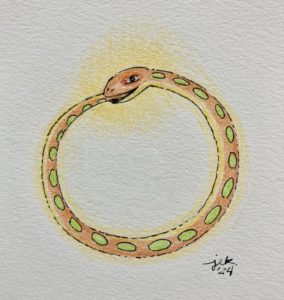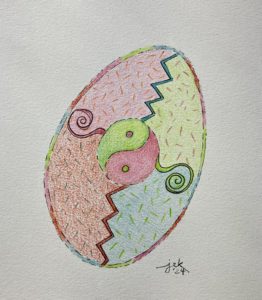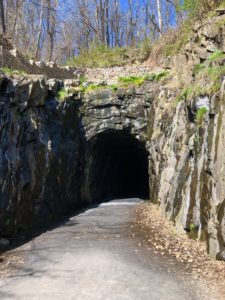
-Artwork © 2024 Jan Ketchel
Every person alive in this extraordinary time is part of a major world transition. The question is whether this is a nightmare that must be completed or whether it’s time to choose a new dream.
The gods have unequivocally made certain that world events reveal the truths for all to see. And so it appears that what’s being asked is for humankind to assume full responsibility for deciding what comes next. Nightmare or regenerative dream?
Behind it all is the very real clash of opposites, inherent both in wholeness and in all of us.
Jane Roberts, who delivered to the world the epochal teachings of Seth, spent the last year and a half of her life confined to a hospital, her body completely locked in a fetal position, incapable of independent movement.
Jane’s mother had suffered and died from rheumatoid arthritis. Jane never saw her mother walk and spent her childhood and early adulthood at the beck and call of her mother’s bedpan. In her very early childhood, Jane spent two years in a repressive Catholic orphanage due to her mother’s inability to care for her. Her mother largely blamed Jane’s existence for her own medical woes.
Similar to many other extraordinary psychic adventurers, Jane’s traumatic childhood dissociated her into the largess of subtle energy exploration. She published short stories, science fiction novels and poetry before she ultimately met, and channeled, the wise, evolved human being, no longer in human form, who called himself Seth.
The opposites that riddled Jane’s existence were the part of herself that she designated the sinful girl of her childhood, who needed to be punished, and the adult channel she became, with access to the wisdom, critical in our time, to keep the human dream alive and evolving into deeper balance.
Jane had compensated for her neglected and abused beginnings with a spiritual drive that was intent upon discovering the deeper truths beyond everyday existence. It was not until later in life, fully frozen in her hospital bed, that she was forced to recapitulate the experiences of her neglected younger selves, with their limiting negative beliefs that had driven her discomfort with being a woman in this life.
Her total dependence upon nurses, and her husband Rob, allowed her to experience maternal care at a near infantile level, challenging the deep-seated unworthiness of her childhood. In addition, by embodying her mother’s limiting disease she was able to experience deep love and empathy for her mother’s frozen self, freeing herself of the burden of resentment.
Jane’s heroic journey of ego compensation for traumatic beginnings is the heroic journey of most human egos. It represents the competitive solution to the problem of the opposites. In this scenario, heroic compensation defeats the legacy of trauma, at least temporarily.
Many a successful adult can trace their current good fortune to the one-sided discipline they brought down upon themselves to escape the fate of their origins. As successful as one-sided solutions may be, eventually, often by midlife, the knock of the spirit insists we retrieve the opposites we have left behind.
The extremes of Jane’s life required that she literally experience her mother’s full body paralysis in order to relive her childhood and face the depths of her own self-hatred and the negative beliefs she carried about herself.
Throughout Jane’s hospital stay, as she encountered the fullness of her night sea journey, Seth guided and supported her healing. Her devoted husband, Rob, would often massage her arms and legs, and at times Jane experienced her steeled muscles softening, permitting significant movement.
Generally, however, the physical and emotional pain resulting from such release of defensive tightness would rebound into redoubled resistance to movement by the next day.
This scenario is a reversion to a competitive solution to the problem of reconciling the opposites inherent in our wholeness. Given an opening, the habitual solution to go to defense to ward off the pain and fear of true freedom reasserts itself with abandon.
On a practical level, the use of self-hypnosis to introduce to the subconscious new suggestions to old habits was freely employed by Jane and Rob, often with great success. However, the resource of new beliefs cannot override the necessity of recapitulation. We can never fully progress beyond where we are if we are not ready to bring all of ourselves with us: the good, the bad and the ugly.
As Jane discovered, and as her story reveals, no one else can heal us. No one else has lived our life and no one else knows the depths of our most painful experiences. Only we know what truly needs to be reconciled. Thus, only through our own exploration of our opposites, through the process of recapitulation, by taking a deep and thorough dive into our darkness, can we succeed in bringing ourselves into the light of full regenerative healing.
Of the many gifts that Jane Roberts left behind, I appreciate the full transparency of her offering of the complete annals of her life to the Yale University Library. What they, and Rob’s uncensored notes of the last year of her life reveal, to all of us, is how tenacious the problem of reconciliation of opposites truly is. Even a direct confrontation with potential death itself can fail to avert the well worn habit of a one-sided defensive solution that precludes reconciliation with one’s whole self.
Beyond this competitive solution of opposites is the full acceptance of all of one’s life experiences. This advances one to full self love, as well as love for everything and everyone else.
Everything and everyone is part of our own wholeness. With that level of truthful acceptance we are freed from the bindings of competitive solution, freed to choose the regenerative dream. It’s the obvious right choice, and it includes the welfare of all.
Thank you, Jane, for pointing out the true depths of the challenge of recapitulation. Thank you, also, to all of you scouts, who have done the work and are stalking the regenerative dream beyond the eclipse.
Recapitulating,
Chuck
Suggested reading:
The Body Keeps the Score, Bessel van der Kolk
The Recapitulation Diaries, J. E. Ketchel
The Way Toward Health, A Seth Book, Jane Roberts




